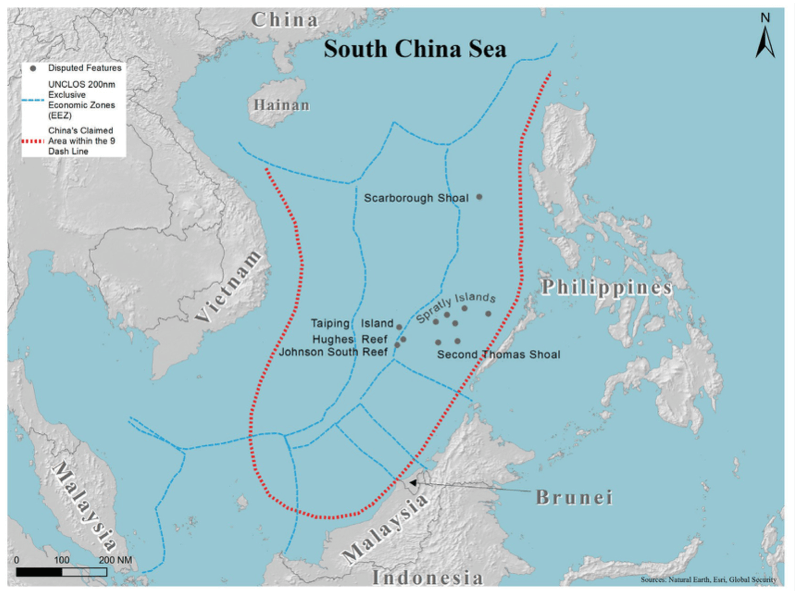Indonesia's New Leader Accidentally Boosts China's Maritime Claims
The Indonesian government may have accidentally legitimized China's sweeping claim to sovereignty over far-flung reaches of the South China Sea. Over the weekend, the newly-elected administration of Indonesian President Prabowo Subianto signed an MoU with Beijing for "maritime joint development" in areas of "overlapping claims."
By virtue of geography, there are no overlapping claims between Indonesia and China under the UN Convention on the Law of the Sea. The two nations are so distant from each other that their distance-based UNCLOS boundaries do not overlap. However, under its history-based "nine-dash line" claim, China insists that it controls part of the Indonesian EEZ, including waters up to a thousand miles away from the Chinese mainland.

Courtesy U.S. State Department
In the past, Indonesia has been careful to emphasize that it recognizes no overlapping Chinese claims, since it has no shared boundary with China. By consistently denying the legitimacy of China's "nine-dash line," Indonesia can better defend its rights in any future litigation and negotiation, according to international law experts. So when news broke that President Subianto had signed a statement recognizing "overlapping claims" with China, Indonesia's foreign-affairs community was scandalized. While Subianto's statement is geared towards cooperation on oil and gas development, the language of the text appears to recognize a legitimate sovereignty dispute, and experts say that this might be used against Indonesia in arbitration.
"If Indonesia recognizes the overlapping claims as something that exists, it might change the dynamics with the negotiation of the [Code of Conduct for the South China Sea] as well as the solidarity of the ASEAN states in facing China. China can say that Indonesia has recognized [its claims], so this could weaken the position of ASEAN itself," Aristyo Rizka Darmawan, a lecturer at University of Indonesia, told This Week in Asia.
On Monday, Indonesia's foreign ministry backpedaled, stating that the oil and gas partnership does not have any bearing on sovereignty or jurisdiction in Indonesian waters. "Indonesia reiterates its position that [Chinese] claims have no international legal basis," the ministry said emphatically.
However, China's foreign ministry doubled down on the language in the joint statement, despite Indonesia's belated protest. For the Chinese foreign ministry, the signed MOU shows an intent to pursue "joint development in the overlapping maritime areas claimed by the two countries."
China demarcates claim around Scarborough Shoal

that matters most
Get the latest maritime news delivered to your inbox daily.
China's claim to the South China Sea has been deliberately vague since its initial publication in 1947, and is defined only by nine (recently broadened to 10) coarse dashes in a curving tongue-shaped line. On Sunday, after the Philippines enacted new legislation formalizing its EEZ, China released a defined set of coordinates for its claim to Scarborough Shoal, a Philippine reef that has been occupied by Chinese forces for more than a decade. It is the first time that Beijing has ever given precise coordinates for its unusual claims in the region.
"This is a natural step by the Chinese government to lawfully strengthen marine management and is consistent with international law and common practices," Beijing's foreign ministry said in a statement.
